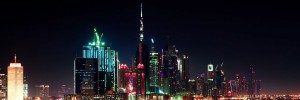By Shayne Currie www.nzherald.co.nz
Eww, eww and awe … Shayne Currie suffers vertigo in the world’s tallest building.

We are soaring above the desert. One hundred and twenty four floors in one minute – an elevator travelling at 40km/h. At home, a lift in the NZ Herald building takes that long to move five floors.
It’s an ear-popping ride – there’s only a slight sense of speed wobbles, but the stomach churns. The lift attendant smiles but says nothing. A minute later, the space-age interior opens to a personal hell. Welcome to the viewing deck of the Burj Khalifa in Dubai, the tallest building in the world.
At 828m, the Khalifa is almost three times taller than Auckland’s Sky Tower and tops the world’s next tallest building, the CN Tower in Toronto, by nearly 300m.
It is also, possibly, the last place someone with vertigo should be venturing. I inch from the elevator, which is more than can be said for some.
“We had a group last week that wouldn’t come out,” says a Khalifa senior marketing executive, Waseem Khan.
My shorthand observation notes become a chicken scrawl and I’m thankful there are none of those see-through floor panels they have at Sky Tower.
Although I’m at a respectable distance – okay, my back is affixed to the central wall – the view is stunning, more akin to being in an aircraft than a fixed structure. On a clear day, you can see 85km – into neighbouring emirates – and, from the very top of the Khalifa, you can spot Iran.
The Dubai cityscape looks like a Legoland in a sandpit – skyscrapers that resemble little more than toy blocks. They are castles in the sand and this is the biggest castle of all.
It is a peaceful day on the open-air deck. It was on this deck that Tom Cruise literally popped in during the previous week, dangling in front of tourists during filming of a scene for Mission Impossible IV.
“It was him, it was him,” insists Khan and, indeed, newspaper photographs had Cruise atop the spire of the Khalifa while a helicopter buzzed nearby.
Our slightly cynical tour commentator reckons Cruise wouldn’t have scaled the building – it was more likely his stunt double – and says a replica of the observation deck has been constructed in a warehouse to allow the Hollywood whizz-kids to go crazy with blue-screen technology.
But there are many tall tales about the Khalifa, which has taken on a rather mystical status since an explosive opening last January. (The fireworks extravaganza was so spectacular that Dubai apparently became one giant parking lot.)
There are also rumours a crane base remains embedded in the central core of the top floors so additional levels can be built should those pesky Saudi Arabians try to surpass 828m. But Khan says the crane story is rubbish.
Regardless, it’s hard to imagine there will be a taller building in the next 20 years and, if the Saudis are bold enough to try it, Dubai would be laying foundations quickly for an even higher structure. They do everything bigger in Dubai – from the airport, to shopping malls and indoor skifields.
Perhaps the most telling view of all from the Khalifa is the confirmation of a newfound optimism in Dubai. The cranes have returned and new castles are rising in the sand. Dubai’s face continues to change and, although it pays respect to its past as a trade and pearl fishing port, in reality it remains a city of the future.
The Khalifa, which took five years to build, is the biggest nod of all to the end of the recession. There are reportedly difficulties finding tenants for some of the floors but the building still looks and acts like a giant hypodermic needle, injecting Dubai with a new shot of adrenalin.
The tenants already on site are world class. Giorgio Armani selected the lower levels as the location for his first Armani hotel (another is being planned for Milan). Rooms at the Armani start at $1430 a night for a studio room up to $14,300 a night for the Dubai Suite. Every need is catered for and many rooms offer superb views of the Dubai Fountain – the world’s biggest choreographed light-and-water spectacle – which shoots water 50 storeys to music every night.
The visit to the observation deck is almost complete. I avoid the ubiquitous souvenir stall to spend some time on the amazing electronic view finders. Aim the electronic screen and you’ll see the view today – as well as digital imagery of the same scene 20 years ago (mainly desert with a handful of low-rise buildings).
While the observation deck is at the 124th floor, this won’t be the best view. The three highest floors – 152, 153 and 154 – are earmarked as a corporate function centre. Just hold on to your champagne flutes while you’re there – in high winds, the top of the building is designed to flex more than 1.25m in all directions.
It’s enough to send vertigo sufferers to the comfort of the supersized Dubai Mall next door.
CHECKLIST
Getting there: Emirates flies three times daily from Auckland to Dubai and beyond with direct connections to 25 destinations in Europe. Dubai stopover accommodation and activities are also available through.
Burj Khalifa: General admission (pre-booked online) costs 100AED ($36) for an adult and $27 for children. Immediate entry is $143 regardless of age. Infants under 3 get in free.
Further information: See burjkhalifa.ae.
Shayne Currie travelled to Dubai courtesy of Emirates.












